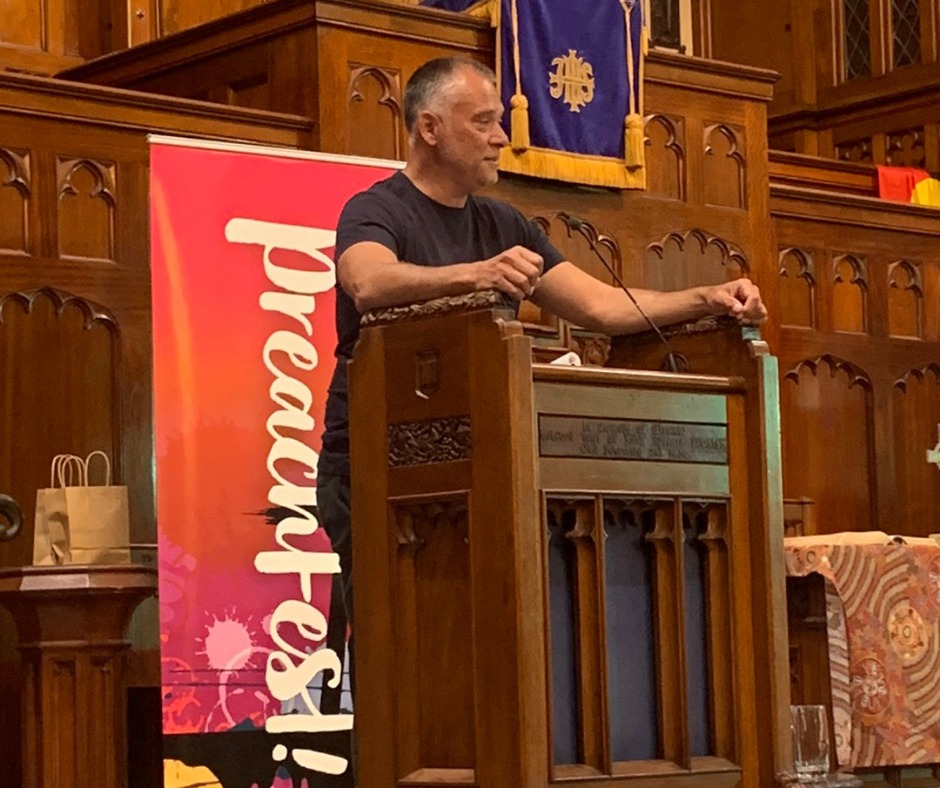Journalist Stan Grant delivered a memorable sermon duing Preachfest on Thursday 2 November.
Speaking at St Stephen’s Uniting Church in Sydney, Mr Grant pointed to the event’s location. His sermon also touched on his life of three decades as a journalist, talking to world leaders and being present in war-torn conflicts, growing up in Griffith, his family and his connection to the land, how he accesses God in his life, and his views on the referendum and what it means for this country.
“It’s lovely to be in a building like this, it’s lovely to be here and to share this space with you,” Mr Grant said.
“But this wasn’t the church I was raised in. I was raised in a black church, a church that white people who went to church uptown didn’t step foot in. Ours if anything was a church of forsaken. It was the church of crucified Christ. It was the church of people who cry out ‘my god, my god why have you forsaken me?’ And it’s the church where we never ask, ‘Is God Real?’ that would be impossible for a Wiradjuri person.”
“We are surrounded by God in country and land around which we walk. We don’t ask is God real. We had to ask though, does God care for the abandoned, and forsaken.”
“Prayer was survival, a prayer crying out for the forsaken people.”
In a wide-ranging address, Mr Grant touched upon the inadequacy of words and the way in which God spoke to people in a variety of ways.
“I always knew the presence of God. As a young boy my uncle was a ferocious preacher and he knew that words were all we had. Words to speak back love to people who could not see God in us.”
“Rev. Samuel Marsden, assistant Chaplain in the penal colony, a man of God described my people as the most degraded of the human race and believed we were irredeemable.”
“Those words have carried me into a career of journalism.”
“As a journalist, people of profound faith who knew that God was real facing their own existential crises have spoken to me. As a reporter, words are not enough, but then God speaks.”
Mr Grant also touched upon the recent defeat of the referendum to enshrine an indigenous voice to parliament in the constitution.
“We do not find God in politics,” he said.
“I walk along and ask God to show me something that I should listen to. I found a podcast that said, “In a world of crisis we need serious politicians”. We are in serious crisis because of politicians. We do not need politicians. Our language is politicised and bereft of love and grace. I’m not cynical but I know the transactional nature of politics.”
“How do we reclaim words in a world of politics. We’ve been asked recently to make a decision about words. Two words. Yes and No. How on earth could we have possibly answered the call of God in just two words as if things could be that simple? Asking us to choose whose lives matter more. I voted yes because that’s the word of God. No is the end of things.”
“People always tell me your history is in the past, but my history is just a touch away. When I was born I was held in the crook of my father’s arm. And God is always a touch away.”
“Within half an hour we were told now we must reconcile. Reconciliation has to mean something, we have to reckon with history. This nation is called to its own reckoning. Is my country a Godless nation? Jesus always chooses the side of justice. We don’t get to escape that judgement. What is the erasure of history if it’s not blaspheming.”
“When my people cry out and ask where are you God, God’s answer has always been that I am with you. I am kneeling with you. I am with you in the adversity. I am the bloodied child’s hand print on a box of biscuits.”
“Be still and know that I am God. In the silence we find a death-bringing speech when words matter. Not political speak. Not antiseptic media speak.”
“We have the word “Yindyamurra” but I don’t know if I’ve ever known what I’ve truly known what that word meant. But I needed to grow and accept the full weight of the word. It means respect, invites us into the quiet and sacred silence, it means to be kind and to listen. “Yindyamurra” is a profound challenge to us all because it doesn’t ask who you are. It doesn’t put us into a box.”
“It says I must find myself even to forgive those who have done the worst to me. “Yindyamurra” calls us to be responsible not for just what I do, but for what you do. I am responsible for everything horrible that happens. We breathe the same air. That is the weight of “Yindyamurra”. “Yindyamurra” calls us to a higher register.”
“Indifference is even worse than hate. It is just the turning away. It’s almost that I have felt I need to speak into that indifference. To turn away from it would be to turn away from God. I was given words but God is a better writer than me.”
Stan Grant is the Vice Chancellor’s Chair of Australian/Indigenous Belonging at Charles Sturt University. He was previously the ABC’s Global Affairs and Indigenous Affairs Analyst.
PreachFest 2023 ran from 1 to 3 November, across sites in Sydney and Melbourne. The event was a three day festival created to inspire and enliven the craft, art, and vocation of preaching. Other speakers included Morling College’s Dr Tim Macbride and Amy-Jill Levine.












